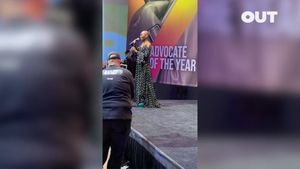Wearing vests
covered in military patches, a band of motorcyclists rolls
around the country from one soldier's funeral to another,
cheering respectfully to overshadow jeers from church
protesters. They call themselves the Patriot Guard
Riders, and they are more than 5,000 strong, formed to
counter antigay protests held by the Reverend Fred Phelps at
military funerals.
Phelps believes American deaths in Iraq are
divine punishment for a country that he says harbors
gay people. Protesters from his Westboro Baptist
Church carry signs thanking God for so-called IED explosives
that are a major killer of soldiers in Iraq.
The bikers shield the families of dead soldiers
from the protesters and overshadow the jeers with
patriotic chants and a sea of red, white, and blue flags.
"The most important thing we can do is let
families know that the nation cares," said Don
Woodrick, the group's Kentucky captain, at that
state's Fort Campbell. "When a total stranger gets on a
motorcycle in the middle of winter and drives 300 miles to
hold a flag, that makes a powerful statement."
At least 14 states are considering laws aimed at
the funeral protesters, who at a recent memorial
service at Fort Campbell wrapped themselves in
upside-down American flags. They danced and sang impromptu
songs peppered with vulgarities that condemned gay
people and soldiers.
The Patriot Guard was also there, waving up a
ruckus of support for the families across the street.
Community members came in the freezing rain to chant
"U-S-A, U-S-A" alongside them.
"This is just the right thing to do. This is
something America didn't do in the '70s," said Kurt
Mayer, the group's national spokesman. "Whether we
agree with why we're over there, these soldiers are dying
to protect our freedoms."
Shirley Phelps-Roper, a daughter of Fred Phelps
and an attorney for the Topeka, Kan.-based
church, said neither state laws nor the Patriot Guard
can silence their message that God killed the soldiers
because they fought for a country that embraces gay people.
"The scriptures are crystal clear that when God
sets out to punish a nation, it is with the sword. An
IED is just a broken-up sword," Phelps-Roper said.
"Since that is his weapon of choice, our forum of
choice has got to be a dead soldier's funeral."
Westboro Baptist Church is not affiliated with a
larger denomination and is made up mostly of members
of Fred Phelps's extended family. During the 1990s,
church members were known mostly for picketing the funerals
of AIDS victims, and they have long been tracked as a
hate group by the Montgomery, Ala.-based
Southern Poverty Law Center's Intelligence Project.
The project's deputy director, Heidi Beirich,
said other groups have tried to counter Phelps's
message but none have been as organized as the Patriot
Guard. "I'm not sure anybody has gone to this length to
stand in solidarity," she said. "It's nice that these
veterans and their supporters are trying to do
something. I can't imagine anything worse--your
loved one is killed in Iraq, and you've got to deal with
Fred Phelps."
Kentucky, home to sprawling Fort Campbell along
the Tennessee line, was among the first states to
attempt to deal with Phelps legislatively. Its house
and senate have each passed bills that would bar protesters
within 300 feet of a funeral or memorial service. The
senate version would also keep protesters from being
within earshot of grieving friends and family members.
Richard Wilbur, a retired police detective, said
his Indiana Patriot Guard group comes to funerals only
if invited by family. He said he has no problem with
protests against the war but sees no place for objectors
at a family's final goodbye to a soldier. "No one deserves
this," he said. (AP)

















































































